
Before diving headfirst into your GRE studies, it’s important you take a little time to familiarize yourself with the three GRE sections: Verbal Reasoning, Quantitative Reasoning, and Analytical Writing.
In this article, we take a close look at the major sections of the GRE, including how they differ from one another, what kinds of questions they give you on test day, and our top tips for acing all three GRE test sections. Finally, we discuss the importance of each GRE section and why grad programs often value one section more than the others.
What Are the GRE Sections? How Do They Differ?
The three sections of the GRE are Verbal Reasoning (Verbal), Quantitative Reasoning (Quant), and Analytical Writing (AW). Each section targets a different topic — reading, math, or writing — to test both your knowledge of basic skills and your overall preparation for grad school.
At a little less than four hours long, the GRE consists of two Verbal sections, two Quant sections, and one AW section, as well as an additional Verbal or Quant section in the form of either an unscored experimental section or an unscored research section.
In terms of order, AW always comes first. Afterward, each Verbal and Quant section appears in a random order. So you could have two Verbal sections followed by two Quant sections, or one Verbal, two Quant, and one Verbal (and so on).
Note that the experimental section can appear anytime after AW and will contain no indication telling you it is an experimental section. The research section, on the other hand, always comes at the end of the test along with an indication telling you it is an unscored research section.
The following table offers an overview of the major differences among the GRE test sections:
Quick side note: we've created the world's leading online GRE prep program that adapts to you and your strengths and weaknesses. Not sure what to study? Confused by how to improve your score? We give you minute by minute guide.
You don't NEED a prep program to get a great GRE score. But we believe PrepScholar is the best GRE prep program available right now, especially if you find it hard to organize your study schedule and don't know what to study.
Click here to learn how you can improve your GRE score by 7 points, guaranteed.
| Verbal | Quant | AW | |
| Focus | Vocab knowledge, reading comprehension | Math (arithmetic, algebra, geometry, data analysis) | Writing (essays) |
| # of Sections | 2* | 2* | 1 |
| Order | Random | Random | 1st |
| # of Questions | 20 per section | 20 per section | 2 |
| Time | 30 mins per section | 35 mins per section | 30 mins per essay |
| Question Types | Text Completion, Sentence Equivalence, Reading Comprehension | Quantitative Comparison, Multiple Choice (Select One Answer Choice or Select One or More Answer Choices), Numeric Entry, Data Interpretation Sets | Analyze an Issue, Analyze an Argument |
| Scoring Scale | 130-170 in 1-point increments | 130-170 in 1-point increments | 0-6 in half-point increments |
*As I mentioned previously, you will also have either an unscored experimental section or an unscored research section, both of which take the form of an additional Verbal or Quant section.
According to the table, each GRE section has its own time limit and number of questions. Both Verbal and Quant contain 20 questions per section; however, Verbal allots only 30 minutes per section, whereas Quant allots 35 minutes per section. For AW, you must write two separate essays, each within 30 minutes.
Finally, each GRE section uses its own scoring scale. Verbal and Quant both use the same 130-170 scale in 1-point increments. Your Verbal and Quant scores can then be combined for a total score out of 340 points (although most test takers and likewise most schools review the scores separately).
AW is different and uses a 0-6 scale in half-point increments. To get your AW score, ETS uses a combination of human graders and an e-rating system, a process we describe more in our article on how the GRE essay is scored.
But what exactly does the GRE test you on? Read on as we explore the three GRE sections in detail to offer you an in-depth look at the types of questions you’ll face and the strategies you can use to get the scores you need for grad school.

The Verbal Reasoning Section
A reading-heavy section, Verbal Reasoning asks you to identify correct vocab words for isolated sentences and paragraphs, and comprehend the main points, meanings, and implications of dense, scholarly passages.
The three types of questions you’ll encounter on Verbal are as follows:
- Text Completion
- Sentence Equivalence
- Reading Comprehension
Below, I explain each of the three question types and then provide you with our top three tips for securing a great Verbal score.
Text Completion
For Text Completion, you must complete sentences using appropriate vocab. Each Text Completion question contains one to five sentences with one to three blanks. Questions with two or three blanks will always offer three possible answer choices per blank, whereas questions with only one blank will offer a total of five possible answer choices (as in the example below).
Note that there is no credit for partially correct answers — you must choose the correct vocab word for every blank in order to earn credit for the question.

Sentence Equivalence
Like Text Completion, Sentence Equivalence revolves around vocab knowledge; however, this time, you must choose two synonymous vocab words that, when substituted for the other, produce two sentences with identical meanings.
Once again, in order to receive credit for a question, you must choose both correct answer choices.
Every Sentence Equivalence problem contains one sentence, one answer blank, and six possible answer choices.
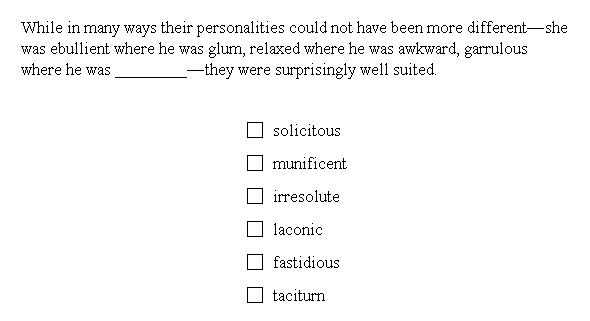
Reading Comprehension
To score highly on Reading Comprehension, you must be able to read and comprehend grad-level texts. More specifically, you should have the ability to:
- Distinguish major points from minor points
- Identify author’s assumptions
- Draw conclusions
- Infer missing information
Passages encompass topics from an array of fields, including the arts and humanities, social sciences, and natural sciences. Most of the time you’ll choose one of five answer choices; other times, however, you’ll have to highlight a particular sentence in the passage or select multiple answer choices.
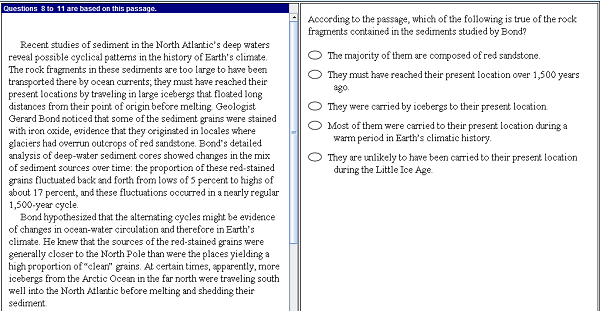

Top 3 Verbal Reasoning Tips
Ready to achieve an excellent GRE Verbal score? Here are our top three tips.
#1: Memorize High-Frequency Vocab Words
High-frequency vocab words are the words most likely to appear on Verbal. By memorizing these words, you’ll have little, if any, trouble recognizing the vast majority of vocab in Text Completion and Sentence Equivalence questions, thereby raising your overall Verbal score.
To study GRE vocab efficiently, we recommend printing out our free deck of 357 high-frequency GRE vocab words. Our compilation is one of the most accurate high-frequency GRE word lists currently available. For more details on how to study GRE vocab using our printable flashcards, refer to our guide.
#2: Practice Reading Scholarly Texts
You’ll be facing a ton of lengthy (not to mention tricky) passages on Verbal dealing with a humongous range of topics, from Renaissance art to microbiology. The best way to prepare for Reading Comprehension questions, then, is to become a voracious reader and devour as many scholarly texts as you can.
Academic journals are an excellent resource to start with, as well as popular publications such as The New York Times and The Economist. Because you’ll likely face a lot of dense scientific passages, too, we recommend perusing some of the abstracts on PubMed in order to practice identifying major themes, research questions, and scientific findings.
Want to improve your GRE score by 7 points? We have the industry's leading GRE prep program. Built by world-class instructors with 99th percentile GRE scores, the program learns your strengths and weaknesses through machine learning data science, then customizes your prep program to you so you get the most effective prep possible.
Try our 5-day full access trial for free:
#3: Use The Process of Elimination
You’re bound to come across at least one vocab word you don’t know. In this case, start by weeding out the answer choices you know are incorrect. This way, you’ll steadily increase your chance of choosing the correct answer choice.
Even if you have no clue what the words mean, it’s always better to just go ahead and guess — the GRE doesn’t dock any points for incorrect answers!
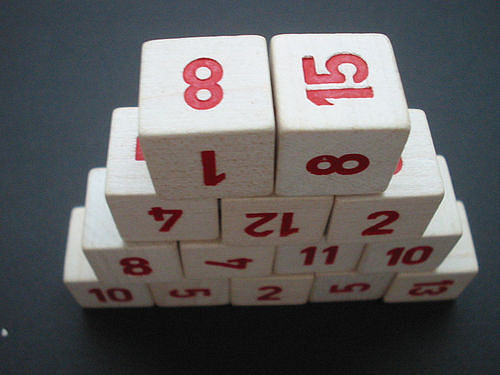
The Quantitative Reasoning Section
The Quantitative Reasoning section centers around basic math (i.e., middle school and high school math). The four math topics it tests are arithmetic, algebra, geometry, and data analysis. For more information on what to expect on Quant, check out our GRE math review.
On test day, you’ll receive ample scratch paper and access to an on-screen calculator with basic math functions (including square roots).
As for the types of questions you’ll encounter on Quant, there are five distinctions:
-
- Quantitative Comparison
- Multiple Choice (Select One Answer Choice)
- Multiple Choice (Select One or More Answer Choices)
- Numeric Entry
- Data Interpretation Sets
Below, I describe each of the five question types and give you tips on how to get the score you want on Quant.
Quantitative Comparison
Quantitative Comparisons account for a little more than a third of Quant, with seven to eight questions per section.
For these questions, you must compare two separate quantities (Quantity A and Quantity B). You’ll get a description (almost all of the time) and four answer choices:
-
- Quantity A is greater.
- Quantity B is greater.
- The two quantities are equal.
- The relationship cannot be determined from the information given.
Quantities can take several forms, such as equations, inequalities, integers, and diagrams. My guide to Quantitative Comparisons offers an even deeper look at how Quantitative Comparisons work and what strategies you can use to solve these questions quickly and accurately on test day.
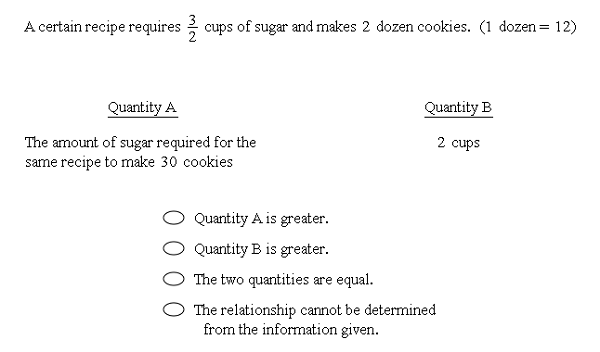
Multiple Choice (Select 1 Answer Choice)
These are your basic multiple-choice questions, each containing five answer choices and one correct answer. They make up about half of Quant and cover a wide array of math topics, from coordinate systems and shapes to data interpretation and probability.
Each answer choice is accompanied by an oval (or a circle with a letter, if you’re taking the paper-delivered GRE).
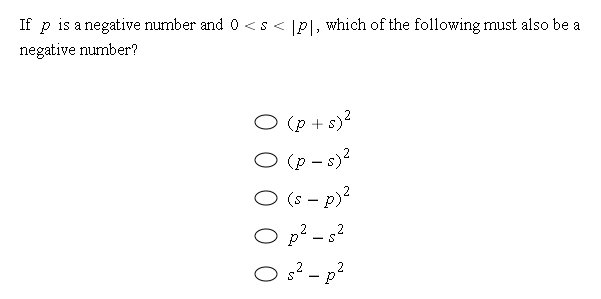

Multiple Choice (Select 1 or More Answer Choices)
These multiple-choice questions are slightly different from the ones above because they allow you to select more than one answer choice. Each Quant section contains about two multiple-answer multiple-choice questions.
On these questions, square boxes accompany the answer choices instead of ovals as a way to indicate you may select more than one answer choice.
Unlike single-answer multiple-choice questions, the number of answer choices often varies for multiple-answer questions. Some will offer five answer choices, some fewer than five, and some more than five. Additionally, these questions will ask you to select either a certain number of answer choices or all valid answer choices, so pay attention to the instructions.
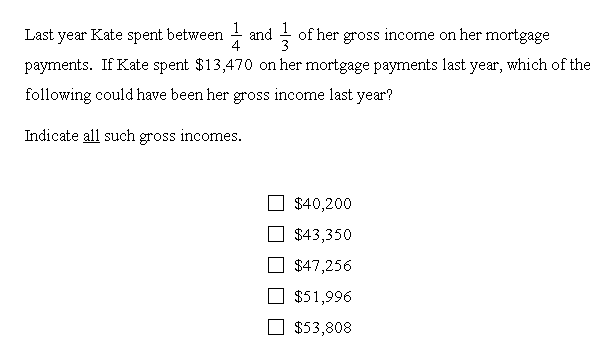
Numeric Entry
Numeric Entry questions are the only questions on the entire GRE (excluding AW) that aren’t a variation of multiple choice. For these questions, you must come up with your own answer and type it in the blank.
According to our estimates, there are only about two Numeric Entry questions per Quant section.
Numeric Entry questions requiring an answer in the form of a fraction will contain a numerator blank and a denominator blank. All other Numeric Entry questions (i.e., those calling for integers or decimals) will contain a single blank.

Data Interpretation Sets
This isn’t so much a question type as it is a notable feature of Quant. Data interpretation sets are questions referring to a specific set of data, such as a bar graph or a table. When presented with data, you’ll often have to answer about three questions in a row concerning different aspects of the data.
Data interpretation questions may take the form of multiple-choice questions (both types) or Numeric Entry questions.
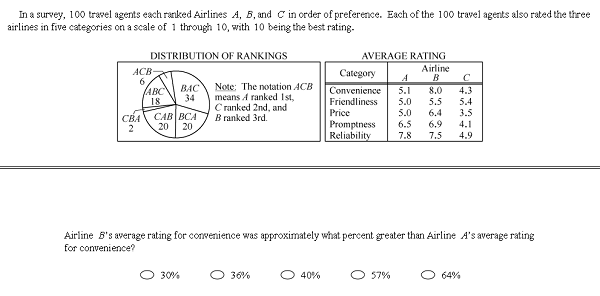

Want to improve your GRE score by 7+ points?
Check out our best-in-class online GRE prep program. We guarantee your money back if you don't improve your GRE score by 7 points or more.
PrepScholar GRE is entirely online, and it customizes your prep program to your strengths and weaknesses. We also feature 2,000 practice questions, official practice tests, 150 hours of interactive lessons, and 1-on-1 scoring and feedback on your AWA essays.
Check out our 5-day free trial now:
Top 3 Quantitative Reasoning Tips
Here, we offer you our top three tips for making your Quant goal score a reality.
#1: Review Basic Math Concepts
Luckily, Quant only tests up to high school-level math and doesn’t reach into any complex, college-level concepts. But most people taking the GRE probably haven’t taken a high school math course in several years, so it’s imperative you review all of the basic math concepts you’ll need to know for test day.
I cover a ton of common GRE math concepts, symbols, and terms in my extensive Quant review. For an even lengthier list of possible GRE math topics, refer to the official ETS Math Review PDF.
#2: Memorize Important Formulas
Many Quant questions can only be solved if you have a basic understanding of common math laws and formulas. But because the GRE doesn’t provide you with a table of important formulas like the SAT does, you’ll need to dedicate some time to memorizing GRE math formulas. Fortunately, we’ve got a a handy list of the top 38 math laws and formulas you’ll need for the GRE!
#3: Plug In Numbers
One of the best test-taking strategies for Quant is to plug in numbers. In this strategy, you’ll either select numbers from the answer choices themselves or make up your own numbers and then plug them into any unknown values or variables. Finally, you’ll solve the problem using the number(s) you’ve chosen and determine whether the answer it produces is correct. This strategy is most helpful if you’re unsure how to use algebra to solve for a specific variable.
There are two ways you can plug in numbers. For multiple-choice questions, plug in the answer choices one by one, starting with C (or whatever the middle value is). C is an ideal starting point, as it shows you whether you’ll need to plug in a higher or lower value (unless the correct answer is C — if so, lucky you!).
If you’re dealing with a Quantitative Comparison, however, choose your own set of numbers and plug them in one at a time. You may select whatever numbers you want, but generally it’s best to compare extremely different numbers, such as a positive and a negative number, a whole number and a fraction, a zero and a non-zero number, etc. This way, you can confirm that the math holds up for all possible options — even rarer values.
Remember, the GRE doesn’t care how you get an answer — just that you get the right answer. So when in doubt, plug away!

The Analytical Writing Section
The Analytical Writing section tests you on your ability to develop a clear and cogent essay with supporting evidence, a logical flow, and technical accuracy (i.e., correct grammar, spelling, punctuation, and capitalization).
For this section, you must write two separate essays: “Analyze an Issue” and “Analyze an Argument.” While there’s no way of predicting which prompts you’ll receive on test day, you can access all issue and argument topics online through the ETS website.
Below, we explore what kinds of essays you’ll need to write for AW as well as how you can guarantee yourself an impressive AW score.
Analyze an Issue
For this essay, you must choose a side of an issue and then defend your stance with ample evidence and coherent reasoning. Note that your opinion does not need to be a full “agree” or “disagree” — you’re free to agree with certain parts of the issue and disagree with others so long as you explain why you are doing so in a clear and compelling manner.
Additionally, your grade is not based on what side of the issue you choose but on how you construct your essay to effectively support your position. For more information, check out the full scoring guide for the issue task on the ETS website.
Like all essays, your issue essay should include an introduction, a thesis, supporting paragraphs, and a conclusion.
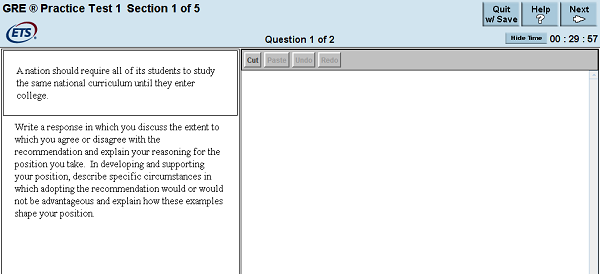
Analyze an Argument
For the argument essay, you are not arguing your own opinion; instead, you are analyzing the soundness and logic of an author’s argument. To effectively evaluate an argument, you must consider what kind of supporting evidence the author uses as well as whether the author makes any hasty or unfounded assumptions.
The official scoring guide for the argument essay is available online at the ETS website.
Like the issue essay, the argument essay must contain an introduction, a compelling thesis, ample supporting evidence, and a conclusion.
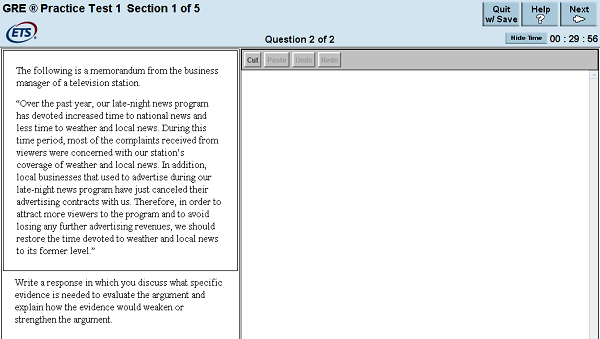

Top 3 Analytical Writing Tips
Read our top three AW tips below so you, too, can walk away with a great AW score!
#1: Skim the Essay Topic Pools
ETS has done all of us test takers a wonderful favor by providing us with two pools of all potential GRE issue and argument essay topics.
Unfortunately, there are so many prompts it’s impossible to write mock essays for each one. This is why we recommend skimming the essay topics to familiarize yourself with the kinds of prompts the GRE uses.
Then, as a part of your GRE study sessions (and instead of drafting an entire essay every time you sit down to study), you can select a prompt at random and use it to practice writing an essay outline. This will save you both time and energy while still allowing you to get a feel for the kinds of topics you’re likely to encounter on test day.
#2: Make an Outline
Outlines are critical to doing well on the GRE essay portion. On test day, don’t just start writing your essay as soon as you finish reading the prompt; instead, spend about five minutes constructing an essay outline on your scratch paper. This way, you’ll have all of the organization and major details already planned out before you even begin writing your essay.
#3: Address Counterarguments to Strengthen Your Rhetoric
On both essays, don’t be afraid to play devil’s advocate by acknowledging (and eviscerating) counterarguments. Addressing the other side shows you’ve considered the topic from all possible angles.
Although including a counterargument might sound counterintuitive, in actuality doing so can ultimately strengthen your argument, as long as you successfully explain why the counterargument is flawed, ineffective, or illogical.

Are Some GRE Sections More Important Than Others?
So far, we’ve provided you everything you need to know about the three sections of the GRE, including what kinds of questions they test you on and how you can get the scores you want on test day. But do grad schools really care about every single one of your GRE scores? The answer is, not really.
Of all GRE test sections, AW is by far the least important. Most grad programs don’t pay a lot of attention to your AW score — perhaps because they feel your personal statement and writing sample (if required) are better indicators of your writing ability than a timed essay on a standardized test. In fact, for even the most prestigious grad schools, a score of just 4.5 (82nd percentile) generally indicates you’re in great shape.
But what about Verbal and Quant? While we know these two GRE test sections are more important than AW, how important Verbal or Quant is ultimately depends on your field and program. Generally, Quant is more important to those entering math-heavy fields such as the sciences and engineering sectors, whereas Verbal is more important to those entering reading-heavy fields such as the humanities and social sciences.
As a result, GRE expectations for programs are often higher for the GRE sections more relevant to the program’s field. This means you can expect higher Verbal minimums for English doctoral programs and higher Quant minimums for computer science master’s programs.
Some programs won’t even divulge any score expectations at all for the less relevant GRE section. For example, Indiana University Bloomington’s English doctoral program prefers applicants with GRE Verbal scores higher than 160 — but doesn’t even mention Quant scores at all!
Review: The 3 GRE Sections
The three GRE sections are Verbal Reasoning, Quantitative Reasoning, and Analytical Writing. Each section tests a different skill set — i.e., reading, math, and writing — as a way to gauge whether an applicant is sufficiently prepared for grad school.
Verbal consists of 20 questions per section and targets vocab knowledge and reading comprehension. Quant, too, consists of 20 questions per section but instead targets basic math (i.e., arithmetic, algebra, geometry, and data analysis). Finally, AW focuses on your writing abilities and requires you to compose two separately timed essays.
To recap, here are our top nine strategies for doing well on the three GRE sections:
- For Verbal: Memorize high-frequency vocab words, practice reading scholarly texts, and use the process of elimination on test day
- For Quant: Review basic math concepts, memorize important formulas, and plug in numbers when you’re not sure how to solve a problem or are struggling to use algebra to find an answer
- For AW: Skim the essay topic pools and practice writing outlines for random essay prompts; spend the first five minutes of each essay writing an outline; and address (and criticize) counterarguments to strengthen your rhetoric
Of all GRE sections, AW almost always carries the least amount of weight for grad schools, so it’s more important to aim for a high Verbal or Quant score depending on which section is more relevant to your field.
What’s Next?
Want more information on how the GRE works? We cover everything you need to know about what’s on the GRE and what the exam pattern is in our in-depth guides.
For premier GRE tips and strategies, read our top 34 GRE tips and learn the #1 thing you must do to improve your GRE scores!
Ready to get the best GRE score you can get? Check out our guides on how to pass the GRE and how to get a great GRE score.
Ready to improve your GRE score by 7 points?
We've written a eBook about the top 5 strategies you must be using to have a shot at improving your GRE score.
Download it for free now:

